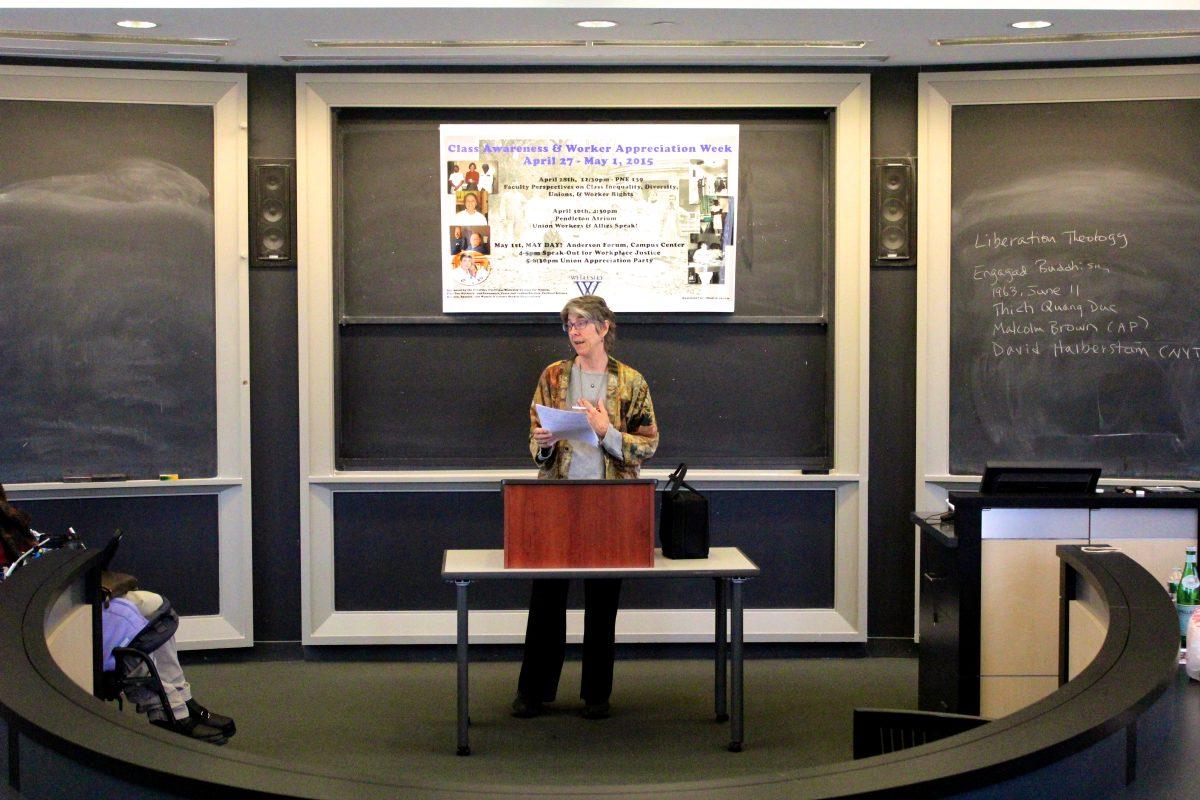This year’s first annual Class Awareness and Worker Appreciation Week features events such as panels and a May Day rally, and is hosted by the Diversity Coalition, a group comprised of faculty, students, administrative staff and union workers.
A panel, “Union Workers and Allies Speak!” will take place in Pendleton Atrium tomorrow at 4:30 p.m., and a May Day rally speak-out in Anderson Forum will be on May 1 at 4 p.m.
The Diversity Coalition returned last semester after a two-year hiatus and is an offshoot of the academic council’s Committee Against Racism and Discrimination (CARD).
“In September when we first met, we started literally from scratch. It took little time for our committee to get inspired and energized, largely because we felt deeply that Diversity Coalition had to do whatever we could to empower and honor the Union workers,” Religion Professor Jim Kodera said. Kodera, one of two faculty members who were key in revitalizing the Diversity Coalition, also noted that this year was the first that any activist committee with faculty involved took up the concerns of union workers at the College.
The events slated for this week seek to educate the Wellesley community about issues surrounding class inequality and oppression on campus, and in the world at large. These events are the culmination of the Diversity Coalition’s efforts throughout the year.
“We created the week to draw attention to the issue, because…although faculty here support economic justice, we are not always aware of problems that may be happening in our own backyard. There needs to be education about the issue of class and classism at the College. Perhaps there needs to be a community–wide dialogue about reducing class inequality at Wellesley,” Economics Professor Julie Matthaei said. Matthaei is the other professor active in Diversity Coalition and joined the committee this semester.
Matthaei also drew notice to the subject of class in conjunction with factors such as race and gender. This intersectional approach to addressing class inequality at Wellesley stems from the fact that union workers receive the lowest pay of all workers at the college while also representing the highest number of racial and ethnic minorities compared to other College staff groups.
In addition, the Diversity Coalition hopes to shed light on what it means to be working class at Wellesley.
“The goal of the week is really to make workers feel more a part of the Wellesley College community and appreciated rather than alienated. We also want to discuss class issues, both the economics and social realities of being working class,” Union Representative Tricia Diggins said.
Yet the idea of union and food service employees being classified as “working class” is contentious. For example, according to Matthaei, food service employees’ average wages slightly declined over the past eight years from $15.96 to $15.46 per hour, despite the rising cost of living in Boston and its surrounding areas.
Moreover, many union and food service employees work second jobs to generate additional income. To that end, Diversity Coalition launched a poster campaign as part of Class Awareness and Worker Appreciation Week, with statements like, “Wellesley College Food Service Employees want you to know ‘We work for Wellesley, not AVI!’ ” and “Wellesley College Food Service Employees want you to know ‘We need second jobs to make ends meet.’ ”
Matthaei also drew attention to the College’s health insurance policy, which currently states in the 2012 union agreement between the College and Independent Maintenance and Service Employees’ Union of America, “During the term of this 2012-2015 Agreement, the College shall contribute an amount equal to seventy-five percent (75%) of the premium cost of the standard HMO [health maintenance organization] health plan for both individual and family coverage, regardless of the plan chosen.” In addition, according to Matthaei, new, full-time Dining Service employees have to pay more than 25 percent of their base annual pay to get family HMO health insurance and basic dental coverage.
The College’s payment policy for contributing to the cost of health insurance is uniform across all employee groups of the College. According to Wellesley’s employee handbook, the College contributes 75 percent of faculty’s health plan cost. This, however, is three percent of the average Wellesley professor’s salary of $145,000 and less than one percent of President Bottomly’s base salary of $601,000.
Not all colleges require the same percentage of health insurance contribution costs, though. Harvard, Brown, Dartmouth and Yale all progressively base the rate of contribution on the level of employee wages, meaning that employees who earn less contribute a smaller percentage of their salary toward health insurance.
Moreover, in addition to the flat health insurance contribution policy, according to data from 2012, more than 90 percent of female union employees at Wellesley earned less than the average male union worker. The average gross wage of a female employee, $40,569.82, was 73.8 percent of the average male wage of $54,938.38, and about half of dining services employees are female.
These issues of inequality are some of what Diversity Coalition hopes to address among students and faculty to generate discussion about class inequality at Wellesley through panels, discussions and the May Day rally this week.
“I think it is also important that Wellesley resist the nationwide trend of lowering real wages for less skilled workers, and instead affirm our commitment to paying our workers at least a living wage,” Matthaei said.
Class Awareness and Worker Appreciation Week coincides with May 1, which is International Workers Day. In light of the holiday, Diversity Coalition is hosting a rally on May 1 at the Lulu Chow Wang Campus center at 4 p.m., and will also feature students active in Wellesley’s First Generation group. Students who are interested in being involved with Diversity Coalition’s work are encouraged to attend the rally and to join the committee next semester.
Photo by SooJin Jeoung ’17, Photography Editor










